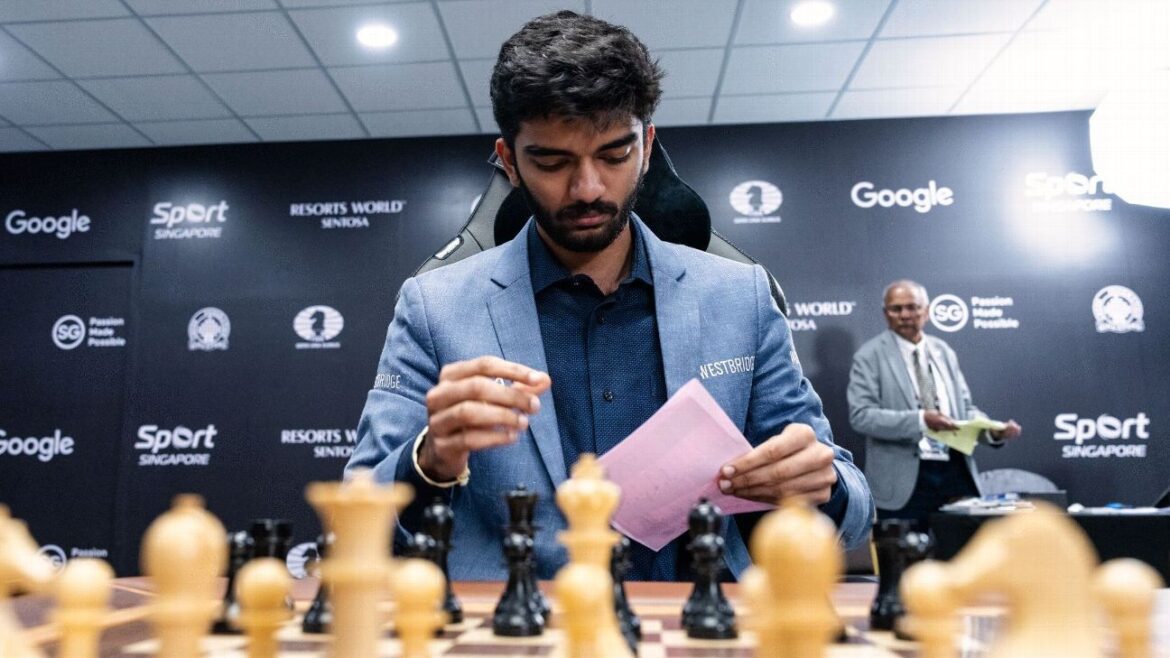After the high of becoming the youngest-ever chess world champion at the end of 2024, it has been a challenging 2025 for Gukesh Dommaraju. His recent exit from the World Cup in the third round rounded off a tough year, where poor results in big competitions have, by extension, seen his very status as world champion questioned.
His coach, Grzegorz Gajewski, isn’t worried just yet though. He points to Gukesh’s age, and says that sometimes, you need to accept the inconsistencies that come with being a teenager in elite sport. After all, it was just earlier this year that he only lost the Tata Steel Masters title to R Praggnanandhaa on tie-breaks and pushed Magnus Carlsen all the way at the Norway Chess event. He beat Carlsen during that event in Stavanger, and then again in rapid chess at the Grand Chess Tour event in Zagreb.
But amidst those positives, the two biggest events of the year have been failures. The FIDE Grand Swiss, where he finished 41st, and the FIDE World Cup both ended with terrible results for Gukesh. He struggled at a couple of other classical events as well – the Sinquefield Cup and the Superbet Chess Classic. That plus Gukesh’s poor performances at the Freestyle Chess Tour, and his continued struggles in the faster time controls mean that, by any standards, 2025 has been a poor year for the world champion.
In an exclusive chat with ESPN, Gajewski points to how winning the world championship title has necessitated a reset from Gukesh. “When you work all your life for something, and then you get it, you have to find new motivations, it can be difficult for someone so young,” Gajewski says.
The wider chess world, though, won’t see Gukesh’s age and be considerate about it. For them, he’s the world champion, and they have no reason to make concessions for their world champion. He must compete for every title, at every format, in every time control. This is a sport that is too used to seeing its world champion be as close to perfect as sporting champions can get, and that’s what it expects from every future world champion too. It may be seen as unfair, but that is the world Gukesh is dealing with now.
Gajewski, for one, says he is perplexed by some of the doubts over his ward’s world champion status. “Does he deserve the world championship? Of course he does, because he won it,” Gajewski says, while also saying that he thinks the outside noise hasn’t affected Gukesh too much so far.
The likes of former world champions Garry Kasparov and Magnus Carlsen have been vocal in their criticism this year, with the former even going on to say that the world championship crown doesn’t feel the same resting on Gukesh’s head as it did on the likes of himself, Vladimir Kramnik or Carlsen.
Now, is Gukesh in the realm of a Kasparov or a Carlsen yet? No, and he’d be the first to laugh at such a statement. He has a long way to go, he recognises that, his team knows that.
The latter part could be the key. Gajewski says the mistakes that have seen tournaments slip away this year, aren’t unusual for Gukesh. From a chess perspective, he says he knows what the faults are but wouldn’t elaborate – understandably so with a title defence to come.
One key learning Gajewski did speak about, though, was about choosing just how much chess to play, and how many different styles and formats. This year, Gukesh played on the Freestyle Chess Tour, the Grand Chess Tour, big invitational classical tournaments like Tata Steel and Norway Chess, and some high-profile exhibition tournaments as well. In 2026, Gukesh’s team is set to be a bit more selective in choosing the tournaments he plays in.
The challenge here is in balancing opportunity and furthering the champ’s chess education with a need for a break and a reset. For example, the Clutch Chess event last month in the US, where Gukesh played against Carlsen, Hikaru Nakamura and Fabiano Caruana, was too good an opportunity to refuse because how often do you get to play the three best players in the world in the same tournament? But would a break have done him better in that period?
These are the kind of questions his team is grappling with, as they acknowledge that his reign so far has been a difficult one. For now, they are focusing on putting in place the building blocks for him to defend his crown next year, where the focus will continue to be on classical chess – even if they will continue to go hard at big tournaments in other formats, like the World Rapid and Blitz Championships in Doha next month
Gukesh said last year after being crowned champion that he wasn’t the best player in the world, and that’s what he wanted to be. On the evidence of 2025, he’s further away from being the best player in the world now than he was back then. But in 2026, he has a chance to set that right, by taking the right lessons from 2025.
Defending his world championship crown may not make all the questions about his elite chess ability go away, but there will certainly be a lot less noise about whether he’s a deserving holder of the crown. Logically, how would anyone question the legitimacy of a back-to-back world champion?
Grzegorz Gajewski and Gukesh Dommaraju have been through this grind once, and they’re both fully committed to doing it all over again, in a bid to keep ahold of the crown they so memorably won in Singapore last year.
